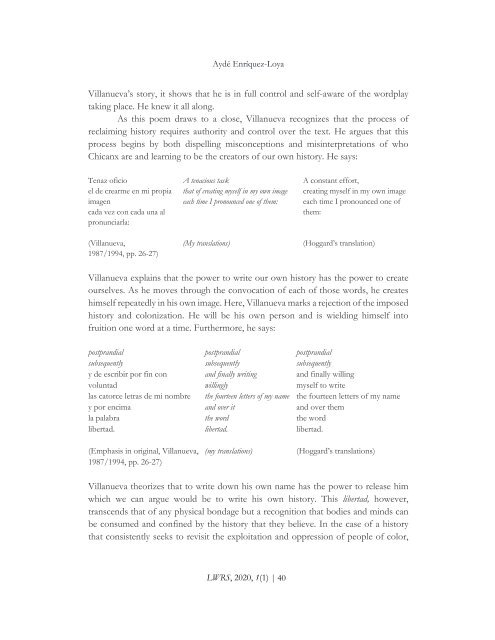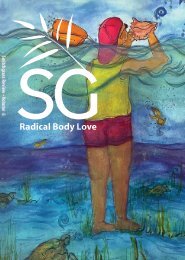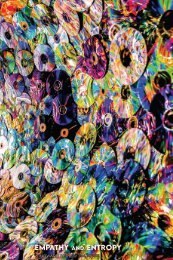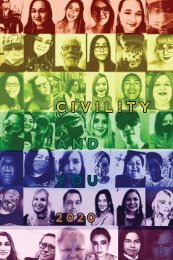LWRS June 2020 Volume 1, Issue 1
Inaugural Issue co-edited by Yndalecio Isaac Hinojosa and Isabel Baca
Inaugural Issue co-edited by Yndalecio Isaac Hinojosa and Isabel Baca
Create successful ePaper yourself
Turn your PDF publications into a flip-book with our unique Google optimized e-Paper software.
Aydé Enríquez-Loya<br />
Villanueva’s story, it shows that he is in full control and self-aware of the wordplay<br />
taking place. He knew it all along.<br />
As this poem draws to a close, Villanueva recognizes that the process of<br />
reclaiming history requires authority and control over the text. He argues that this<br />
process begins by both dispelling misconceptions and misinterpretations of who<br />
Chicanx are and learning to be the creators of our own history. He says:<br />
Tenaz oficio<br />
el de crearme en mi propia<br />
imagen<br />
cada vez con cada una al<br />
pronunciarla:<br />
(Villanueva,<br />
1987/1994, pp. 26-27)<br />
A tenacious task<br />
that of creating myself in my own image<br />
each time I pronounced one of them:<br />
(My translations)<br />
A constant effort,<br />
creating myself in my own image<br />
each time I pronounced one of<br />
them:<br />
(Hoggard’s translation)<br />
Villanueva explains that the power to write our own history has the power to create<br />
ourselves. As he moves through the convocation of each of those words, he creates<br />
himself repeatedly in his own image. Here, Villanueva marks a rejection of the imposed<br />
history and colonization. He will be his own person and is wielding himself into<br />
fruition one word at a time. Furthermore, he says:<br />
postprandial<br />
subsequently<br />
y de escribir por fin con<br />
voluntad<br />
las catorce letras de mi nombre<br />
y por encima<br />
la palabra<br />
libertad.<br />
(Emphasis in original, Villanueva,<br />
1987/1994, pp. 26-27)<br />
postprandial<br />
subsequently<br />
and finally writing<br />
willingly<br />
the fourteen letters of my name<br />
and over it<br />
the word<br />
libertad.<br />
(my translations)<br />
postprandial<br />
subsequently<br />
and finally willing<br />
myself to write<br />
the fourteen letters of my name<br />
and over them<br />
the word<br />
libertad.<br />
(Hoggard’s translations)<br />
Villanueva theorizes that to write down his own name has the power to release him<br />
which we can argue would be to write his own history. This libertad, however,<br />
transcends that of any physical bondage but a recognition that bodies and minds can<br />
be consumed and confined by the history that they believe. In the case of a history<br />
that consistently seeks to revisit the exploitation and oppression of people of color,<br />
<strong>LWRS</strong>, <strong>2020</strong>, 1(1) | 40





